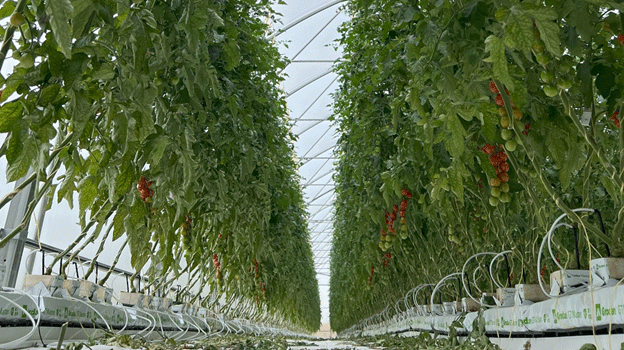As climate change intensifies and droughts become more frequent, water is emerging as one of the most precious resources in agriculture. Globally, agriculture accounts for about 70% of total water consumption, making efficient water use essential for sustainable food production. In regions like Lower Saxony, Germany, where water scarcity is already a reality, new farming techniques are needed to secure crop yields without overstraining natural water reserves.
This is where the HypoWave system steps in—an innovative hydroponic farming method that uses recycled municipal wastewater to grow vegetables. The goal is simple: minimize the use of fresh water by recycling wastewater while maintaining high crop yields. This concept has now moved beyond research and into practical application in a 1,600-square-meter greenhouse at IseBauern GmbH & Co. KG in Wahrenholz, near Gifhorn.
A New Standard in Hydroponics
Traditional hydroponic farming already uses less water than conventional soil-based methods, but HypoWave takes this further by completely replacing fresh water with treated wastewater. The water is processed through multiple stages, including microfiltration, activated carbon biofiltration, sand filtration, and UV treatment, to ensure it is free of contaminants and rich in essential nutrients like nitrogen and phosphorus. According to Thomas Dockhorn, project leader at the Technical University of Braunschweig, “The HypoWave system allows us to achieve a dual benefit—efficient water reuse and optimal nutrient delivery to plants.”
Currently, the IseBauern greenhouse uses the treated wastewater to cultivate two out of fifteen hydroponic lines dedicated to growing tomatoes. The goal is to expand this system across the entire greenhouse, where up to 11,000 kilograms of tomatoes could be harvested annually, showcasing the system’s scalability and effectiveness.
A Real-World Test for Sustainable Agriculture
The transition from theory to practice is crucial for any innovation, and the IseBauern project serves as the largest real-world laboratory for wastewater-reuse farming systems. Martina Winker from the Institute for Social-Ecological Research (ISOE), one of the project’s coordinators, emphasizes the importance of this practical application: “This is a unique opportunity for research. We can scientifically track the development of the HypoWave system from pilot phase to market readiness and explore questions around quality management, marketing, and stakeholder collaboration.”
The project represents a “win-win” situation for both the agricultural and water management sectors. By recycling wastewater, the farm reduces its dependency on seasonal rainfall and groundwater while municipal water treatment facilities benefit from using their resources more effectively. Christian Lampe, managing director of the local water utility, Wasserverband Gifhorn, is optimistic about the broader applications of this method. He notes, “The ability to use treated wastewater for irrigation opens up new possibilities for conventional farming and could lead to more widespread adoption.”
A Step Toward Climate-Resilient Agriculture
For the IseBauern farm, the HypoWave system represents an investment in the future. As Stefan Pieper, a representative of IseBauern GmbH, explains, “This project allows us to decouple our farm’s water needs from seasonal shortages, protecting our crops from the impacts of extreme weather. It’s a viable solution for climate adaptation in agriculture.”
Beyond the farm, the potential for HypoWave to be used on a wider scale is significant. If successful, the system could serve as a best-practice model for other regions facing water scarcity. As part of the HypoWave+ project, funded by the Federal Ministry of Education and Research (BMBF) with €2.8 million, the goal is to explore how this system can be adapted to different environments and crops, making it a cornerstone of future sustainable farming practices.
The HypoWave system offers a glimpse into the future of agriculture, where water reuse and efficient farming techniques are essential to maintaining global food security. By demonstrating that high-quality crops can be grown with recycled wastewater, the project not only addresses the immediate concerns of water scarcity but also sets the stage for more resilient, climate-friendly agricultural practices. As this innovative approach continues to evolve, it has the potential to become a game-changer for both farming and water management industries worldwide.










